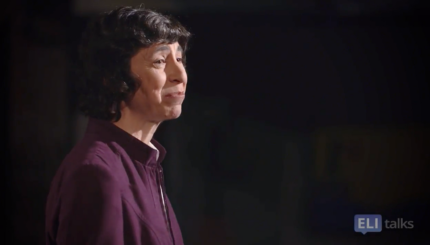The word for “comfort” (lenahem) in Hebrew can also mean to “regret.” One of the most difficult parts of gaining comfort after a loss is to stop regretting what was in the past, and to move on to a different reality. In essence, accepting comfort is being able to cope with and adapt to a new and changed reality.
One of the ways we can do that as humans is to have empathy for others. I want to look at two examples of men who achieved the ability to be comforted after the death of a loved one, in part by their identifications with others and learning to see the world from the perspective of another. This empathy and ability to achieve comfort led them to have a wider impact on the world than they might have had otherwise.
In this week’s Torah portion, Haye Sarah, Isaac is able to be comforted about his mother’s death once he has married (Genesis 24:67). The meaning of comfort here is that he is now fully aware that his reality is different, that he has to go beyond what had been. Part of how he journeys to this new awareness is through his physical journey. He changes his place and goes to Beer Lehai Roi to pray (Gen 24:62) and after Abraham’s death, settles there (Genesis 25:11).
We wouldn’t expect this of Isaac. After all this “well of the living God” is the place that his father’s concubine had been exiled to by his mother Sarah precisely so that Isaac would not be mocked and harmed by his half sibling Ishmael.
It is Isaac’s identification with Hagar – the midrash suggests he is going to fetch her to reconcile her and his father after Sarah’s death – that I believe makes the difference for him in his ability to be comforted. If receiving comfort is a coping with a changed reality, then he has begun this by going to be in Hagar’s place, Beer Lehai Roi, not the Beersheva of his father. Isaac is not clinging to his mother but going to a place where Sarah had exiled Hagar and which Hagar names (Gen 16:15). This shows him moving past his mother’s death.
Isaac, in this week’s Torah portion, is the first person to be comforted after the death of a loved one in the Torah. Interestingly, Judah (Genesis 38:12) is another biblical figure who learns to take comfort after the death of a loved one, his wife Bat Shua, and later goes on to sire twins. A midrash in Genesis Rabba draws connections between Rebecca and Tamar as women who both veil themselves (the word tzaif, scarf or veil appears in both stories Genesis 24:65 and Genesis 38:14, 19 and not elsewhere) and later have twins. But as far as I know, no one has spoken of the commonalities between the two fathers: both comforted after a death and the father of twins.
When one experiences a death there is an element of shock and utter incomprehension; that it is not possible the world is this way. One is overcome by the desire to escape this seemingly false reality, whether by burrowing under the sheets into sleep (we think of the tardemah, the deep sleep that Jonah experienced), by going deep into a cave (Lot and his daughters in Genesis 19), or through intoxication (Noah and his drinking Genesis 9:20-21). Few are able to right away accept a situation and learn to adapt to new circumstances and find comfort.
The ability to find comfort in a difficult situation is an ability to re-envision the world, to make it over anew and acknowledge that a new order is looming. Isaac has the unique ability to do that. Is it because his physical ability to see was harmed at the akeidah, sharpening his spiritual senses? Is the loss of one making up for the other? Perhaps Isaac is able to sire twins in part because he is able to see in a doubled way, both the glories of the past and the fortunate aspect of the present, at one and the same time.
Judah also, originally was willing to have his daughter in law Tamar put to death until she reminds him, with irrefutable proof of identity, that he has fathered the child with whom she is pregnant. Judah acknowledges his flaw in not taking responsibility for Tamar’s future and marrying her to his third and final son. Judah was, like Isaac, comforted after the death of his wife Bat Shua (Genesis 38:12), and then became a person able to move forward and coincidentally also to bear twins.
Isaac moves forward in life, dwelling at Beer Lehai Roi and later uncovering wells that had belonged to his father. Judah, learning from Tamar how to take responsibility for his deeds, is able to admit the guilt of all the brothers publicly to the vizier of Egypt. I believe that these private moments of comfort, acceptance of a changed reality, and identification with women (Hagar and Tamar), led Isaac and Judah to be more effective public leaders.
Torah
Pronunced: TORE-uh, Origin: Hebrew, the Five Books of Moses.



